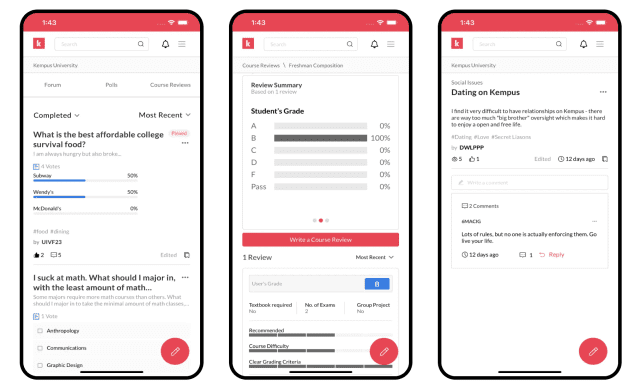Remember reading evaluations on Rate My Professors to see which professors are attractive and who offer easy A’s? One of the few web 1.0 sites that is still active today is the professor and class ratings site. When news streaming firm Chedder purchased the platform in 2018, it had 6 million monthly users.
Its long-term significance impressed Jae Lee, a South Korean serial entrepreneur schooled in the United States and based in Singapore, but the site is far from ideal. Because identities aren’t verified, there’s no way to check the legitimacy of reviews. For all, students consider it as more of an “entertaining” site than something serious on which they base their course decisions, according to Lee in an interview.
Yet, the success of ratemyprofessors.com demonstrates students’ need for a site where they can support each other with their academic experiences. Lee and his co-founder Danny Woo set out to create Kempus, an anonymous online community for college students in the United States.
Kempus, in particular, attempts to develop a reservoir of information to assist students in achieving their ultimate objective, or, in Lee’s words, “the upstream of getting a college degree.” Such knowledge, or what the inventor refers to as “a unique data set within higher education,” can range from professor ratings to advise for buying used textbooks, housing reviews, and how to seek on-campus counseling.
Also, see: Hong Kong demonstrates desire to be a hub for crypto with new regulations
“We are democratizing the level of access to information, which starts with course reviews,” says Lee.
Kempus, founded in August 2022, just acquired $3 million in a seed round from Bithumb Korea, a major cryptocurrency exchange in South Korea, despite the founder’s denial that the company intends to associate itself with cryptocurrencies.
According to Lee, the reason for accepting funds from Bithumb is that Kempus is basically a data firm, therefore “we chose to pitch our idea to a seed investor who had prior investments relevant to a data-driven business, including but not limited to the blockchain, under their portfolio.”
Several studies have shown that adolescents are particularly vulnerable to the negative effects of social media. Kempus frames itself more as a “community” that taps into students’ experiences and expertise, in contrast to ambitious firms like Fizz that promote “secure and private” social networks for college students, piquing investor interest in the “next Facebook.”
Users can only access their own campus communities and are anonymous, but their identities are validated using their school emails. In order to provide a safe environment, Kempus developed a self-governing system that allows students to report negative offenders. The first step [of filtering] is the community, according to Lee, because “We’re not these mega social media where we can hire thousands of people in the Philippines to moderate content, so the first layer [of filtering] is the community,” says Lee.
The second layer is really Kempus, which awards points to students for their content-creation efforts. By doing this, the business hopes to take on the role of facilitator rather than a moderator or censor.
Kempus is contacting faculty members and student organizations at several colleges in an effort to entice early users. Since the MVP (minimal viable product) was only released in late January, it is still too early to determine whether the product has found its target market. Although course reviews may seem like a specialized niche, Lee believes that the startup’s strategic advantage lies in its restricted focus.
















